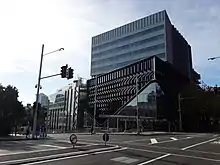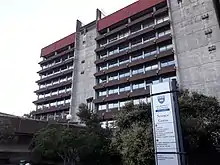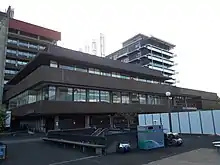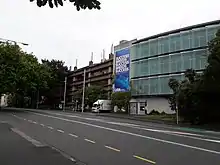University of Auckland Faculty of Science
The University of Auckland Faculty of Science is one of eight faculties and schools that make up the University of Auckland.
| Type | Public |
|---|---|
Parent institution | University of Auckland |
| Dean | Professor John Hosking |
| Students | > 7,000 |
| Location | , |
| Website | www |
Location




The Faculty of Science houses several Schools, Departments and Institutes. These are based in various locations, including the City Campus, Newmarket Campus, Leigh Campus, Tāmaki Innovation Campus and the Grafton Campus.[1]
In November 2013, the Faculty of Science embarked on a NZ$200m redevelopment/expansion project on its main buildings in the City Campus.[2] Following multiple delays,[3] the state-of-the-art Science Centre was opened in July 2017.[4] The Faculty of Science administration office is based on level 6 of the new Science Centre. In 2018, design work has begun for the potential development of a new "Gateway building" on Symonds Street to replace the Thomas Building Complex for the School of Biological Sciences.[5]
Divisions
The Faculty of Science comprises the following Schools and Departments:
- School of Biological Sciences
- School of Chemical Sciences
- School of Computer Science
- School of Environment
- Institute of Marine Science
- Department of Mathematics
- Department of Physics
- School of Psychology
- Department of Exercise Sciences
- Department of Statistics
The Faculty of Science also hosts several research institutes and centres:
Science Programs
Undergraduate Programs
- Bachelor of Science (BSc)
- Graduate Diploma in Science (GradDipSci)
In 2020, the Faculty of Science will offer a new four-year programme called Bachelor of Advanced Science (Honours) (BAdvSci(Hons)), a programme that is designed for high achieving students who want to pursue postgraduate research.[8]
Conjoint Programs
- Bachelor of Arts/Bachelor of Science - (BA/BSc)
- Bachelor of Commerce/Bachelor of Science - (BCom/BSc)
- Bachelor of Engineering(Hons)/Bachelor of Science - (BE(Hons)/BSc)
- Bachelor of Science/Bachelor of Nursing - (BSc/BNurs)
- Bachelor of Music/Bachelor of Science - (BMus/BSc)
- Bachelor of Property/Bachelor of Science - (BProp/BSc)
- Bachelor of Science/Bachelor of Laws - (BSc/LLB)
- Bachelor of Science/Bachelor of Laws(Hons) - (BSc/LLB(Hons))
Postgraduate Programs
- Honours
- Bachelor of Science (Honours)
- Postgraduate Certificate/Diploma
- Postgraduate Certificate in Information Technology
- Postgraduate Diploma in Science (PGDipSci)
- Postgraduate Diploma in Applied Psychology (PGDipAppPsych)
- Postgraduate Diploma in Bioscience Enterprise (PGDipBioEnt)
- Postgraduate Diploma in Clinical Psychology (PGDipClinPsy)
- Postgraduate Diploma in Forensic Science (PGDipForensic)
- Postgraduate Diploma in Operations Research (PGDipOR)
- Masters
- Master of Information Technology
- Master of Speech Language Therapy Practice (MSLTPrac)
- Master of Professional Studies in Data Science (MProfStuds)
- Master of Professional Studies in Digital Security (MProfStuds)
- Master of Professional Studies in Food Safety (MProfStuds)
- Master of Professional Studies in Mathematics Education (MProfStuds)
- Master of Science (MSc)
- Master of Bioscience Enterprise (MBioEnt)
- Master of Operations Research(MOR)
Doctoral Programs
- Doctor of Philosophy (PhD)
- Doctor of Clinical Psychology (DClinPsy)
Other Programs
- Graduate Certificate in Innovation and Entrepreneurship (GradCertInnovEnt)
- Graduate Diploma in Innovation and Entrepreneurship (GradDipInnovEnt)
- Postgraduate Certificate in Commercialisation and Entrepreneurship (PGCertCE)
- Master of Energy (MEnergy)
- Masters of Commercialisation and Entrepreneurship (MCE)
- Certificate of Proficiency (COP)
Official magazine
inSCight is the official magazine of the Faculty of Science at the University of Auckland. It was first published in 2007. The magazine is published annually. The target audience of the inSCight magazine is the alumni and friends of the faculty.[9]
References
- www
.auckland .ac .nz /en /science /about-the-faculty /our-faculty /locations-and-maps .html - "$1b Auckland Uni expansion on the books". New Zealand Herald. 18 June 2013.
- "Weak, faulty concrete discovered at university". New Zealand Herald. 6 May 2015.
- "New science facilities opened at University of Auckland". Education Central. 29 August 2017.
- "Annual Report 2018" (PDF). The University of Auckland. 2018.
- "Centre for Green Chemical Science promotes research, education and outreach". The University of Auckland. 24 May 2018.
- "Taranaki's Dr George Mason donates $5 million to new environmental research centre". stuff.co.nz. 4 June 2016.
- "New Science degrees". The University of Auckland. Retrieved 16 December 2019.
- "inSCight issues". The University of Auckland. Retrieved 16 December 2019.